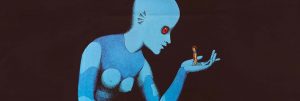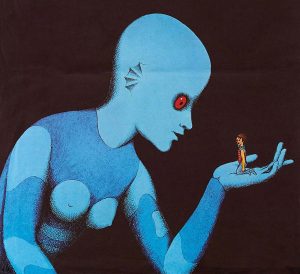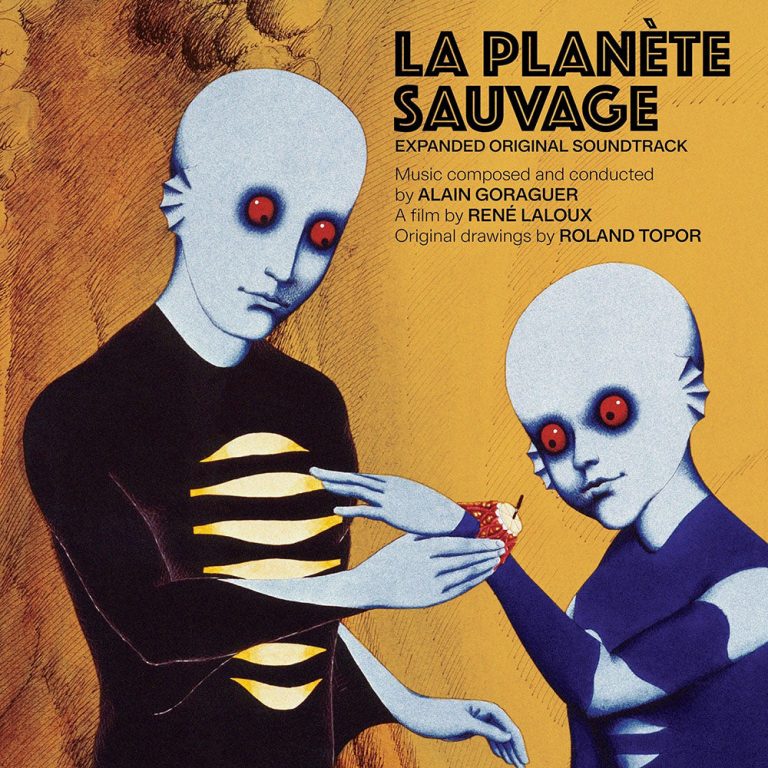The first time I ever heard of Alain Goraguer was shortly after I listened to Madlib’s debut studio album as Quasimoto, a furry character from an imaginary place called The Lost Gates.
In the late 1990s, Madlib – real name Otis Jackson Jr. – was an upcoming hip-hop producer from Oxnard, California, who rose to underground prominence as part of the group The Lootpack.
High on mushrooms in the studio one day, he created Quasimoto, the “bad character”, rapping outrageous lyrics in a high-pitched helium voice over weird collage-style beats, based on samples from the most out-there records he could find.

One of those records was “La Planète Sauvage”, a soundtrack album by French composer Alain Goraguer. For his track “Come On Feet”, Madlib mixed elements of the tune “Ten Et Tiwa” with a Little Feat drum break and snippets from a cult Blaxploitation movie by Melvin van Peebles, “Sweet Sweetback’s Baadasssss Song”.
The debut Quasimoto album, “The Unseen” was released in the year 2000 on L.A. independent label Stones Throw and massively influenced other hip-hop producers like Flying Lotus, J Dilla, and DJ Shadow. Subsequently, Goraguer’s music ended up on records by more mainstream artists such as Mac Miller, Rick Ross, and A$AP Mob.
Madlib wasn’t the first beatsmith to sample “La Planète Sauvage”, but he popularised the soundtrack among the global digger community. Another short tune from it, “Le Bracelet,” had landed on the vinyl breakbeat series “Dusty Fingers”. Those records compiled sample sources of rap songs, revealing the secrets of hip-hop producers and courting their resentment along the way – as they would often use these snippets without proper credit and clearance.
Since those days, “La Planète Sauvage” has become part of a half-secret digging canon. Producers, DJs and music fans started checking out the film as well – a forgotten French animated science-fiction movie that surprisingly won the Jury Prize at the 1973 Cannes Film Festival. It was the first time an animated picture had even been included in the official selection.
Like the music, the film is today seen as a cult classic, mentioned in the same breath as Alejandro Jodorowsky’s 1970s movies “El Topo” and “The Holy Mountain”. Based on a book by French author Stefan Wul, who worked as a dental surgeon by the day, “La Planète Sauvage” was almost five years in the making. Its storyline is set on a foreign planet inhabited by blue giants that domesticate humans as pets. The humans rise up and struggle for their independence, using knowledge as their main tool to attain freedom at last.
An embodiment of the concept of the auteur in film, “La Planète Sauvage” involved artisanal craftsmanship in every element of the production – writing, direction, illustration, soundtrack.
Director René Laloux asked Goraguer to score the movie because the prolific composer and arranger had already worked with Serge Gainsbourg, Boris Vian, and Jean Ferrat. Coming in at the tail end of the creative process, after years of hold-ups and setbacks, Goraguer wrote the music in three weeks of early 1973. Under immense deadline pressure, he created the instantly recognizable arpeggio theme which became the soundtrack’s leitmotif.

Recordings took place in just three days in March 1973. One session went down with an extended string section of 26 musicians. The film hit cinemas by the end of the year, to critical and public acclaim. For Goraguer, its success led to more soundtrack work on feature films.
Due to its strong funk overtones – the wah-wah guitar felt like a nod to Blaxploitation cinema and its legendary soundtracks by Isaac Hayes and Curtis Mayfield – hip-hop producers naturally felt drawn to the music when they discovered it 20 years later, on 1990s record fairs in New York and in under-the-counter crates of L.A. record shops.
When the music was performed in its entirety for the first time by an Israeli orchestra in Tel Aviv in 2021, it became clear that this record would not be forgotten again.
Read on… Robert Glasper and Madlib: The Rebirth of Slick
Stephan Kunze is an independent music and culture writer and book author. Bylines in Bandcamp Daily and Tricycle: The Buddhist Review. He is a former global editorial lead at Spotify and the author of the Zen Sounds newsletter on experimental music.
Header image: La Planète Sauvage / Fantastic Planet poster. Photo 12 / Argos Films via Alamy.



